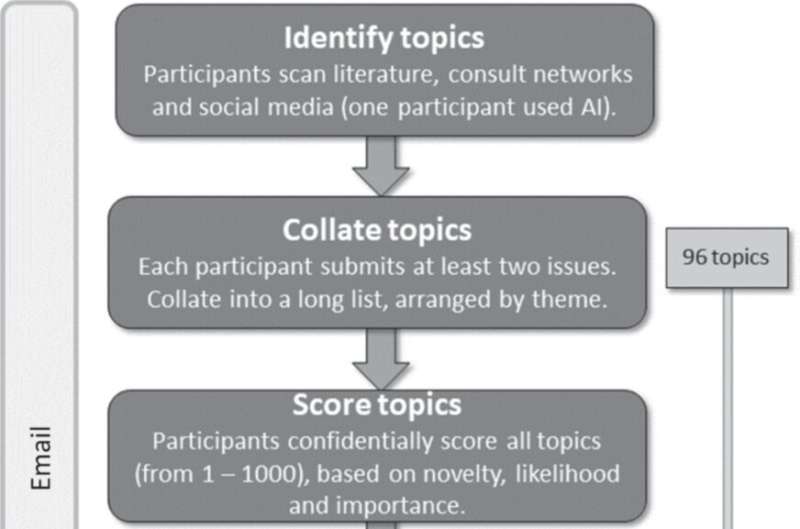This article has been reviewed according to Science X's editorial process and policies. Editors have highlighted the following attributes while ensuring the content's credibility:
fact-checked
peer-reviewed publication
trusted source
proofread
Horizon scan identifies 15 most pressing issues for conservation, including invertebrate decline and marine ecosystems

Since 2009, the Cambridge Conservation Initiative has coordinated an annual horizon scan, a well-established method for predicting which threats, changes, and technologies will have the biggest impact on biological conservation in the following year.
This year, the 15th horizon scan included 31 scientists, practitioners, and policymakers who developed a list of 96 issues, which they eventually narrowed down to the 15 most novel and impactful. Their findings, publishing in the journal Trends in Evolution & Ecology on December 18, include topics related to sustainable energy, declining invertebrate populations, and changing marine ecosystems.
The 15 topics identified by the scan include:
- New sources of hydrogen for energy production, including seawater electrolysis
- Decarbonized ammonia production for fertilizer and fuel using water microdroplets, graphite mesh, and nitrogen
- Making food and animal feed with fish-like nutrients from autotrophic hydrogen-oxidizing bacteria
- Indoor agriculture in urban environments using light-free artificial photosynthesis
- Excessive usage of rock dusts to remineralize large amounts of carbon and put ecosystems at risk for heavy metal contamination
- Earthworm populations to continue declining, especially in farmland and broadleaved woodland area ecosystems, potentially due to pesticides
- Soil ecoacoustics, which project sounds like water moving through soil, poised to help monitor soil ecology and invertebrate populations
- Wildfires to change climate patterns like El Niño by releasing trapped aerosols
- Benchtop DNA printers, which can produce double-stranded DNA sequences on demand, to become increasingly advanced, widespread, and in need of regulation
- New methods to measure a chemical's toxicity before adverse impacts surface
- Saudia Arabia's planned "sustainable" ultra-tall skyscraper city to impact migratory birds
- Sea urchins to continue dying off rapidly worldwide, potentially due to a protist pathogen, which could threaten tropical ecosystems
- Testing methods to remove carbon dioxide from the ocean including using ocean fertilization, macroalgae, and rock injections
- Rising temperatures in the twilight zone to disturb the ocean's biological carbon pump
- Melting Antarctic ice to alter deep sea ocean currents, reducing abyssal overturning by 40% by 2050
"The issues identified in this scan continue to reflect the juxtaposition between anthropogenic impacts on biodiversity and increasing technological capacity to mitigate those impacts," write the researchers, led by conservationist William Sutherland of Cambridge University. "In some cases, new issues arise directly from efforts to mitigate other issues."
The authors identify several common threads in the list of issues, including threats to marine ecosystems. They underscore the importance of recent marine policy initiatives to help address these threats while noting that these efforts will not help resolve the climate-related issues identified. They also discuss the continued importance of innovation in carbon capture and sustainable energy technologies.
"We anticipate continuing to highlight novel emerging impacts of climate change and technologies aiming to mitigate climate change and transition to more sustainable pathways in future horizon scans," write the researchers.
More information: A horizon scan of global biological conservation issues for 2024, Trends in Ecology & Evolution (2023). DOI: 10.1016/j.tree.2023.11.001
Journal information: Trends in Ecology & Evolution , Current Biology
Provided by Cell Press




















